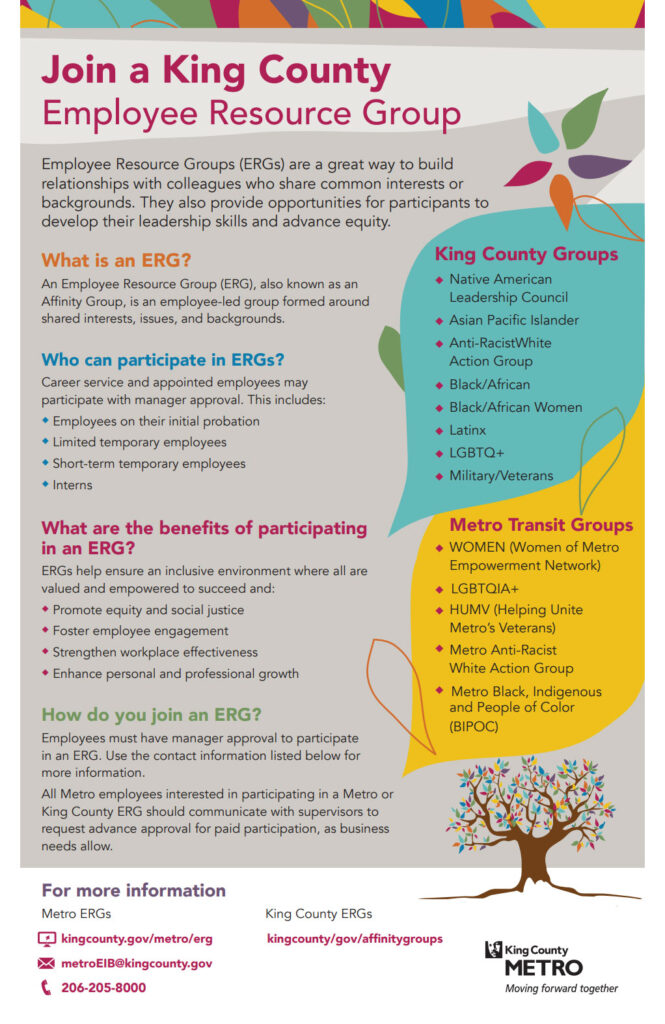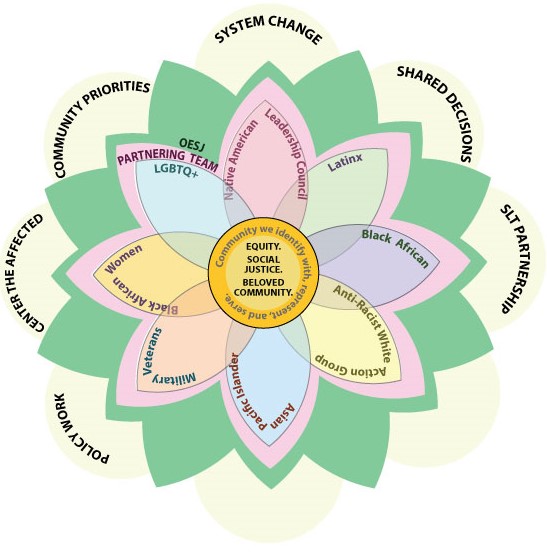
Employee Resource Groups
Metro proudly joins King County in providing opportunities and spaces for employees to come together through employee resource groups. This is an opportunity to build community, share experiences, develop leadership skills and work to advance equity within our workplace and in the services we provide.
Employee Resource Groups (ERGs), also known as affinity groups, are employee-led and focus on state- and federally-protected categories (such as race, gender, veteran status and sexual orientation) and their common interests.
Fill out our form if you are interested in joining a Metro ERG or want to learn more.
Benefits of joining an ERG
ERGs ensure an inclusive environment where all are valued and empowered to succeed.
- Advances equity and social justice
- Builds relationships
- Develops leadership skills
- Shares common interests
- Finds support
All Metro employees who are interested in participating in a Metro or King County ERG should speak with their supervisors to request approval for paid participation up to 3 hours per month.
ERG participation time should be recorded on timesheets using the project/task codes available for each Metro work group as outline in the next question.
Meet colleagues and build skills
King County’s new policy specifies that Employee Resource Group participants can use up to three hours a month to attend meetings and activities. ERG leads may use up to 6 hours each month. Participants may attend multiple Employee Resource Groups within the 3 hours allotted per month. Please note that time spent organizing or at ERG meetings and events is not eligible for overtime.
Employee Resource Groups work with leadership to inform policies and procedures that address racism and other forms of oppression. ERGs help build relationships with colleagues who share common interests or backgrounds, provide opportunities for participants to develop their leadership skills, and strengthen workplace effectiveness. ERGs also embody our foundational principle of equity and deliver on our commitment to invest in our workforce.
These efforts are supported by the Office of Equity and Social Justice countywide and, at Metro, they are supported by our Office of EEO/Equity and Inclusion.

How to join an ERG
Employee Resource Group participants can use up to three hours a month to attend meetings and activities. ERG leads may use up to 6 hours each month. Participants may attend multiple Employee Resource Groups within the 3 hours allotted per month. Please note that time spent organizing or at ERG meetings and events is not eligible for overtime.
All Metro employees who are interested in participating in a Metro or King County ERG should speak with their supervisors to request approval for paid participation up to 3 hours per month. ERG leaders may use up to 6 hours each month. Participants may attend multiple Employee Resource Groups within the 3 hours allotted per month. Please note that time spent organizing or at ERG meetings and events is not eligible for overtime.
ERG participation time should be recorded on timesheets using the project/task codes available for each Metro work group. If you are having trouble figuring out the task code, please reach out to your supervisor or MetroEIB@kingcounty.gov.
How to start an ERG
Interested in creating a new Metro ERG? Contact MetroEIB@kingcounty.gov or fill out the form to get started.
Metro ERGs
Metro Black, Indigenous, and People of Color (BIPOC)
Fourth Thursday, 1 pm to 2 pm
Metro’s BIPOC ERG focuses on building relationships, creating collective power, deepening sense of self and dismantling systems of oppression.
Metro ARWAG (Anti-Racist White Action Group)
Meeting times vary monthly
Connected to the KC-ARWAG, this group is formed by and for Metro employees with a focus on education and action to dismantle systems of racism. All Metro employees are welcome to join.
Metro LGBTQIA+
Third Wednesday, 12 to 1 pm
All Metro employees who identify as LGBTQIA + or Allies are invited to connect with peers in an empowering and authentic space.
Women Of Metro Empowerment Network
First Tuesday, 1 pm to 2 pm
All Metro employees who identify as women are welcome to join this group to provide community, skill and career development, and support to create a more equitable workplace for all.
HUMV – Helping Unite Metro’s Veterans
Currently on hold
If you would like to lead Metro’s HUMV group, please reach out to MetroEIB@kingcounty.gov
All Metro employees who have or are currently serving in the US Armed Forces are invited to network with other Veterans to build a culture of equity, promote opportunities for education and employment for Veterans, and coordinate group volunteerism and community outreach.
King County ERGs
All King County employees can join a countywide ERG. Find out more about King County ERGs.

FAQ
What is an Employee Resource Group, also known as an Affinity Group?
An Employee Resource Group (ERG) or an Affinity Group is an employee-led group formed around common interests and backgrounds. For the purposes of this FAQ, the terms Employee Resource Group and Affinity Group are used interchangeably. County ERGs will focus exclusively on protected categories.
What is the purpose of an ERG?
King County is committed to supporting equity in the workplace and community by fostering the development of ERGs. ERGs promote equity and social justice, foster employee engagement strengthen workplace effectiveness, improve leadership abilities, and enhance personal and professional growth within King County. The ERG policy establishes the requirements for the creation of recognized ERGs that support King County employees.
Protected category specific ERGs address racism, other forms of oppression and advance the county’s equity and social justice goals. County ERGs will focus explicitly on protected categories set forth in federal, state, and local anti-discrimination laws. ERGs are a tool for employees to build fellowship, leadership opportunities, and to help ensure an inclusive environment where all are valued, included and empowered to succeed.
Who can participate in ERGs?
Employees eligible to participate in ERGs include career service and appointed employees. This includes employees on their initial probation. Limited Temporary employees, Short-Term Temporary employees, and interns.
Who supports ERGs?
The Equity, Inclusion, and Belonging team supports Metro ERGs.
The Office of Equity, Race, and Social Justice (OERSJ) provides technical assistance to enterprise-level ERGs, those that are interested in starting an ERG, and approves new ERGs.
Who facilitates ERG meetings?
ERG members facilitate their own meetings.
Who are ERGs for? Who should consider attending?
ERGs are for employees who are interested in fellowship with other employees who share a similar identity and have a deep interest in making King County government and the community more just and equitable places.
ERGs are a space for professional growth and making a positive difference in the workplace.
ERGs are a space where employees can develop leadership skills.
How do I join an ERG?
An employee’s supervisor and/or manager must approve employee participation in ERGs. This form is optional and is to be completed if required by your supervisor. The supervisor and/or manager can limit employee time spent in ERG activities when the operational needs of the department cannot be met without the employee’s attendance during the requested time.
If an employee wants to try out an ERG, they must work with their manager to arrange coverage as needed and permission to attend up to 2 meetings on a trial basis. If the employee wishes to continue attending, the manger must sign the employees ERG participation approval form. Overtime may not be used to support ERG meetings or other ERG activities. If the employee is earning or will earn overtime in the week, the employee will be prohibited from participating in ERGs for the week. Please see page 3, section D of the ERG policy.
The employee should contact the leader of the ERG they are interested in participating in for information about meeting times and group member agreements.
Is this program open to all staff?
Yes. ERGs plan the agendas for their meetings in advance and have specific goals they are working towards. If you would like to present a topic at an ERG meeting, please contact the ERG representatives to coordinate the best time for you to attend and have your topic incorporated into the agenda.
If you interested in joining an ERG, contact the leader who can provide background and other information in preparation for your first meeting.
What is the commitment of an ERG member?
Meetings will typically happen once a month with additional meetings at the discretion of the group. ERG participants may use up to 3 hours a month of work time for meetings and other ERG driven activities to further their goals. ERG leaders may use up to 6 hours a month of work time on ERG activities.
The allotted hours include commute time to and from meetings. If more time is needed for a special meeting or commuting purposes, the employee will have to work with their supervisor. County sanctioned events (i.e., recruitment fairs, interview panels, county-sponsored speaker presentations) will not count toward these hours.
Gatherings for social purposes may only take place during time commonly used for meal periods, or before or after worktime. These types of activities and events are voluntary and are not compensated or overtime eligible.
Each ERG will create their own charter, which may include additional requirements for maintaining membership (e.g. terms and expectations for active participation). ERG members are expected to abide by group agreements set by the particular ERG they are participating in.
Can ERGs use county resources (e.g. vehicles and email) to support their work?
Yes, ERGs are sanctioned under County policy and meet during work time. Employees may use King County resources like vehicles and email. Employees must follow the procedures within their own department regarding approval processes to use King County vehicles and other King County resources as needed.
Can I join more than one ERG?
Employees are welcome to attend multiple ERGs within the three hours per month employees are allotted.
How do I start a new ERG?
For Metro ERGs, you will need approval from the Equity, Inclusion, and Belonging team. You can send an email to metroEIB@kingcounty.gov.
For countywide ERGs, submit a proposal to the Office of Equity, Race, and Social Justice.
Can my ERG handle conflicts with my colleague or supervisor?
No. ERG’s purpose and goals must be relevant to advancing broader goals (not personal goals) within King County’s Equity and Social Justice plans.
For consultation on mediation, contact Alternative Dispute Resolution. If you believe you have experienced harassment or inappropriate conduct, please follow the protocol in the Nondiscrimination, Anti-Harassment & Inappropriate Conduct Policy.
